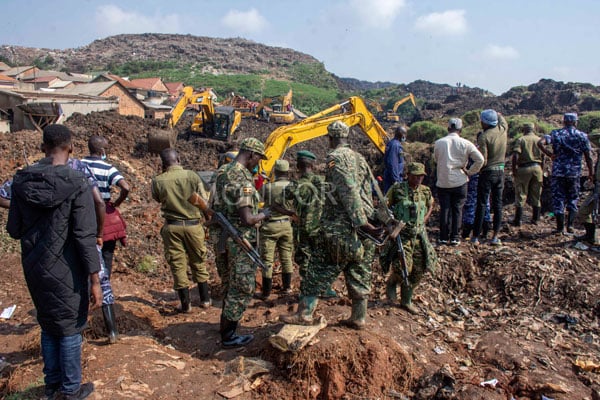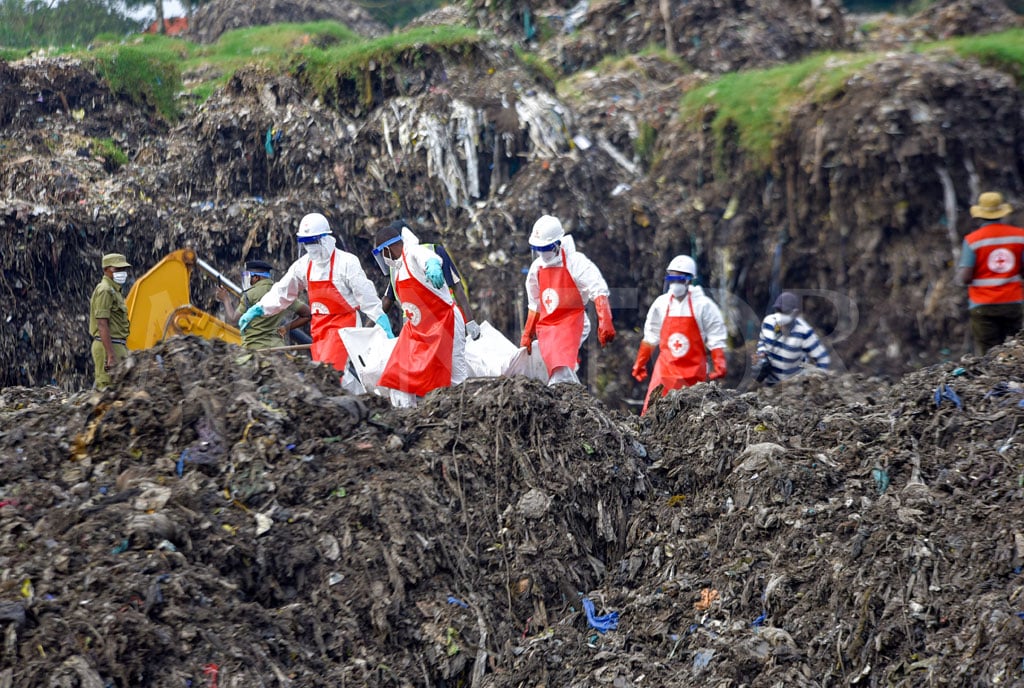
Men at a waste collection point at Kalerwe Market in Kampala yesterday after garbage collection slowed down following Kiteezi collapse. Top executives of Kampala Capital City Authority received pointed warning a month before Saturday’s tragedy that has claimed 30 lives so far. Photos | Stephen Otage
Top executives of Kampala Capital City Authority (KCCA) received a pointed warning a month before Saturday’s tragedy that the mountain of garbage at Kiteezi dumpsite would collapse anytime due to cracks, waste cliffs and unstable slopes.
The honchos last night, however, told this publication that City Hall had no cash at hand to handle the emergency which was flagged a second time this year without cost, and on the second occasion, after the institution’s 2024/2025 Financial Year budget was approved.
Dr Daniel Okello, the director of public health at City Hall, in a July 2 internal memo notified Executive Director Dorothy Kisaka and the Deputy David Luyimbazi that the structural flaws posed “risks to both waste management and community health”.
“Urgent attention and support are needed to mobilise resources for these interventions,” he wrote, having outlined a June 28 waste slide, a blocked drainage and leachate backflow onto farms and depleted operational area as the emergencies then at hand.
Inaction, he noted, was likely to result in “waste slides or landfill collapse”, in turn causing “loss of life and property damage; litigation due to loss of life and property damage, thus attracting huge financial losses; halted waste dumping operations, leading to public health risks and potential public demonstrations; and, the emergenc[e] of illegal dumping places, which will, in turn, be costly to clear in the event of service normalisation”.
Officials, citing financial constraints, appeared to have done little to nothing before the dumpsite tumbled to blanket acres of its residential neighbourhood on the weekend.
Kampala Metropolitan Spokesman Patrick Onyango last evening said bodies of 30 victims had been retrieved from under the debris, with relatives reporting dozens of loved ones who lived in Lusange Village still missing.
In a telephone interview last night, Mr Luyimbazi said the reduction four years ago of KCCA’s annual budget for managing the garbage disposal site, which serves the capital as well as Wakiso and Mukono districts, from Shs6b to Shs4b – despite rising population and solid waste volumes – was counterproductive.
“For the last four financial years, we’ve been arguing for additional funding for Kiteezi landfill. It has always been an unfunded priority. With a limited resource envelope, we can only do so much. The challenge is the resources we have, we have to plan within the limited resources we have,” he added.
Mr Luyimbazi intimated that nonetheless, KCCA Public Health Director Dr Okello did not cost the emergency works he proposed despite Executive Director Dorothy Kisaka tasking him to do so a month before the Saturday calamity.
The finger pointing over the disaster started almost immediately after the landfill collapsed, with President Museveni, who ordered the Inspectorate of Government to investigate the matter, demanding answers on who authorised human settlements next to the garbage dump.
Preliminary findings of the Ombudsman’s inquiry are expected to inform Cabinet debate on the matter and long-term government intervention alongside offering answers on whether the collapse was an accident or negligence by public officials who should be held criminally liable.
“We are already deep into investigation and we have also discovered a number of issues, many of which are systemic issues,” the Inspectorate Spokesperson Munira Ali said by telephone.
The political leadership of the capital, led by Lord Mayor Erias Lukwago, yesterday held a crisis meeting with technocrats under Executive Director Kisaka to thrash out a blueprint of emergency and long-term solution.
The KCCA political executive reportedly ordered the technical staff to within two days provide full accountability on the utilisation of the Shs4.1b yearly spend to maintain Kiteezi dumpsite.
Tempers reportedly flared after Dr Okello, whose letters of January and July showed KCCA was aware months earlier of an imminent collapse of the structurally defective landfill, was a no-show at the big meet.
Lukwago’s response
Lord Mayor Lukwago said they were not provided information on his whereabouts, yet it was ED Kisaka’s responsibility as head of the technical team to cause his attendance.
“We are not going to leave any stone unturned in this particular matter. We have to bring people to account and we insist heads must roll within [KCCA] and it’s the reason we want to dig deep into this matter, get to the bottom of the matter, and appropriate action taken,” he said.
ED Kisaka conveyed condolences to grieving families and said now is not the time to assign blame, but search and recovery to retrieve bodies of persons trapped beneath the sludge, providing humanitarian support to survivors, and acting to stem recurrence of the Kiteezi-type calamity, and pursuing accelerated development of waste-to-energy facility at KCCA’s 136-acre land in Ddundu, Mukono District.
She noted: “The Kiteezi [waste dumpsite] issue has been on the priority list this financial year. The budget process had just ended in June [shortly before Dr Daniel Okello’s red alert] and it was clear there was no budget allocated for Kiteezi in the ministerial policy statement. However, we reached out to access the development budget to address the urgency. While due process was followed, the timing and procedural requirements had not yet been completed [before Saturday’s disaster].”
In a separate December 2023 brief on Kiteezi, Dr Okello informed his supervisors that maintenance challenges encountered at Kiteezi landfill presented “significant risks to public health, safety, and property, as well as jeopardis[ed] the efficiency of waste collection and sanitation within the city”.
At that time, Kampala had registered depressed waste collection, with heaps piling in the inner city markets, streets and neighbourhoods, after torrential rains left the roads to Kiteezi jagged and impassable and the dumpsite itself weak.
“While temporary measures have been implemented to mitigate risks to public health and safety, these do not provide a sustainable solution … given the critical nature of the situation, it is imperative that we mobilise financing to effect these proposed solutions …,” he wrote.
Both ED Kisaka and Deputy Luyimbazi, who spoke to this publication separately, said there was hardly money to get anything done to salvage the situation at Kiteezi despite their best intentions and attempts.
“KCCA did not simply ‘look on’as danger loomed. In fact, significant efforts were being undertaken to mitigate the risks associated with the Kiteezi landfill. Since 2020, KCCA has been actively working on the decommissioning of the Kiteezi landfill,” Ms Kisaka noted, adding that feasibility studies had been completed and required licences are being processed for development of Ddundu land into a modern waste processing facility under a public-private partnership.
She noted: “These actions demonstrate that KCCA was not passive but was actively engaged in a comprehensive strategy to address the challenges posed by the landfill. However, the tragic incident occurred amidst these ongoing efforts, underscoring the urgency of accelerating our plans.
In the midst of the Ping Pong, Uganda Law Society President Bernard Oundo last evening echoed the call for investigations into the disaster, saying assigning responsibility would be premature without established facts.
That notwithstanding, Lord Mayor Lukwago said “We may be collectively responsible institutionally [as KCCA] for the mess that happened at Kiteezi and indeed we take responsibility”.
“But particular individuals within the institution are culpable for this criminal negligence and recklessness and that criminality should not go away unpunished,” he said, adding, “[certain] particular individuals should be brought to book.”




